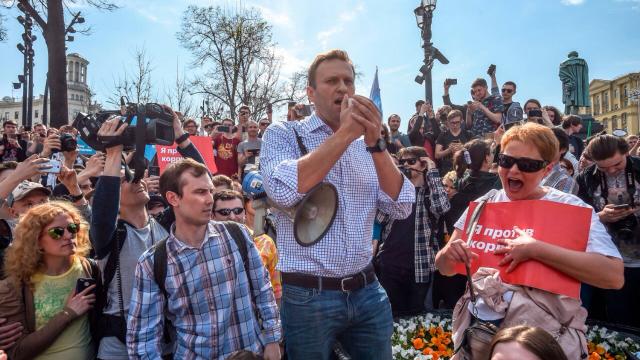The world’s two most powerful tech companies have kowtowed to Putin’s regime, it seems. On Friday morning, Bloomberg reported that Google and Apple have removed longtime opposition leader Alexei Navalny’s voter guide app from the App Store and Google Play store in Russia. Activists have charged the companies with bowing to Kremlin pressure. The Russian parliamentary elections began today and last through Sunday.
On Thursday, Russian state media outlet Tass reported that Vasily Piskarev, head of the Committee on Safety and Anti-Corruption, claimed that Apple and Google had violated the law by “spreading election campaign materials that were not paid for from election funds.” A source told Bloomberg that officials threatened to arrest Russia-based Google employees.
Early Friday morning, Ivan Zhdanov, director of Navalny’s Anti-Corruption Foundation (FBK), tweeted a notice, evidently from Apple, citing a policy that developers must follow local laws. The notice adds:
We note that the Prosecutor’s Office of the Russian Federation and the Prosecutor’s Office of the City of Moscow have also determined that the app violates the legislation of the Russian Federation by enabling interference in the elections.
It goes on to say that the FBK and two of Navalny’s other organisations “are recognised as extremist within the country.” In June, a Russian court ruled in prosecutors’ favour, designating his network “extremist.” After the ruling, the Russian internet censorship arm Roskomnadzor reportedly blocked at least 42 of Navalny’s websites.
The app “Navalny,” reportedly run by Navalny’s team, is currently available in both the App Store and Google Play stores in the United States. The tool for Navalny’s “Smart Voting” strategy aims to tilt voters in each district to rally around one opposition candidate.
Users enter their address with a notice “Find your candidate against United Russia,” and then it recommends a candidate. (In Moscow, for instance, it instructs users to vote for a candidate from the centre-left liberal Yabloko party.) A notice reads “a vote for small parties is a vote for United Russia,” followed by the location of the local polling place and times they’re open.
The Moscow Times has reported that the government has cut off “dozens” of sites associated with Navalny and attempted to block access to the app. According to the outlet, Navalny had planned to only release information about candidates “until the last minute,” once authorities would be unable to remove them from the ballot.
Navalny and fellow anti-corruption dissidents have faced online censorship throughout their movement. In 2014, the Kremlin knocked Navalny’s popular LiveJournal blog offline. Russia has fined Google for refusing to block blacklisted sites from search results and Twitter and Facebook for not storing data domestically.
“What do terrorists do? Terrorists take hostages,” Navalny ally Leonid Volkov tweeted this morning.
Navalny was poisoned on a flight from Siberia to Moscow last year. He remains in prison, where he’s serving a sentence of more than two years.
Apple and Google did not immediately respond to a request for comment.
